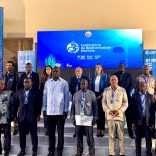EU supports two CSOs that assist technical committee in Mozambique's inclusive political dialogue
Venezuela: Mozambique’s National Electoral Commission (CNE) observed the vote

Photo: CNE & STAE Moçambique
The observation mission of Mozambique’s National Electoral Commission (CNE) to the Venezuelan presidential elections, led by the president of that body, Carlos Matisnhe, on Monday remarked on the “simplicity of the process” and “lessons” learned.
“The competition of political parties is not based on a spirit of enmity or insults and threats against each other, but rather on the presentation of their convictions and ideological lines, respecting their laws and their collective dignity. In short, there are many, but simple, lessons that we noted in the few days of work of our observation mission,” a note released by the CNE today reads.
The Mozambican electoral body states that “around 500 observers from the most diverse countries” participated in Sunday’s elections, including, in addition to Carlos Matsinhe, the Republican Institute for Democracy’s Simeão Nhambe.
“It should be noted that during the observation of the polling stations and polling stations, we were surprised by the simplicity of the process, and the lack of political party inspectors, although they had the right to witness the process. The automated voting format is quite transparent from start to finish,” the same information adds.
“Voters use their ID cards to vote. In other words, in Venezuela there is no voter registration solely for electoral purposes, which saves the country the cost of voter registration, citizens’ time and various resources,” it also states, in contrast to the Mozambican system, which carries out the registration of the entire population with voting rights at each election.
“These elections were markedly participatory and peaceful. Despite the participation of 38 candidates and their respective political parties, the atmosphere was calm, which meant there was greater trust between the competing political parties as well as with the entire electoral system. Venezuela uses an automated digital system, which facilitates both voting and the rapid processing of results,” the CNE observers highlights, adding that “no incidents were recorded, except for a few cyberattacks that were unable to influence the results.”
Just over 17 million Mozambican voters will be called to the polls for the general elections on October 9, which include the election of a new President of the Republic, legislative elections, governors and provincial assemblies.
In Venezuela, the current president, Nicolás Maduro, obtained 5.15 million votes in these elections, ahead of the opposition candidate Edmundo Gonzalez Urrutia, who obtained just under 4.5 million (44.2%), according to the official figures announced by the president of the Venezuelan electoral commission, Elvis Amoroso.
The results were announced after 80% of the ballots were counted, 59% of voters having turned out to vote. The result “is irreversible”, Elvis Amoroso declared.
The Venezuelan opposition claimed victory in Sunday’s presidential elections with 70 percent of the vote, María Corina Machado told reporters. Opposition candidate Edmundo Gonzalez Urrutia won 70% of the vote, the opposition leader said, refusing to recognize the results announced by the Venezuelan CNE.












Leave a Reply
Be the First to Comment!
You must be logged in to post a comment.
You must be logged in to post a comment.